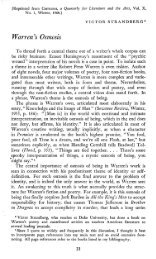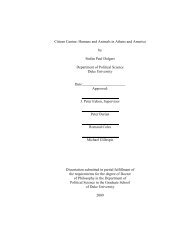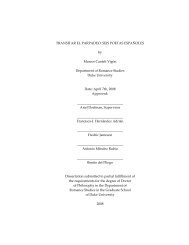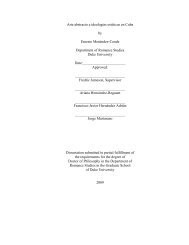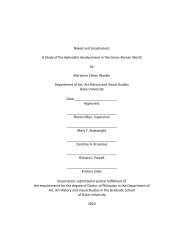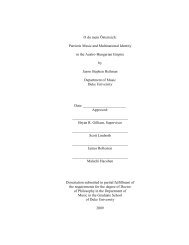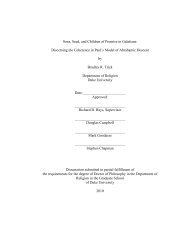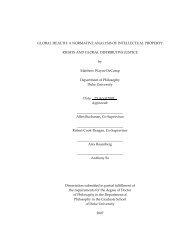View/Open - DukeSpace - Duke University
View/Open - DukeSpace - Duke University
View/Open - DukeSpace - Duke University
You also want an ePaper? Increase the reach of your titles
YUMPU automatically turns print PDFs into web optimized ePapers that Google loves.
Cozy Nest is quickly forced to “[close] its doors for good” to prevent anybody associated with<br />
the tavern – and by extension, homosexuality – being exposed by name (313).<br />
The fate of the Cozy Nest in Crystal Boys presents an interesting anecdote about the<br />
variable impacts of private homosexual experiences that become publicly available. The<br />
circulation of texts about homoerotic liaisons reveals the miscommunication between a<br />
marginalized homosexual subculture and the dominant heterosexist society. Crystal Boys offers<br />
its own publicly distributed “report” to shed light on the private experiences of a shadowy gay<br />
community, forging a discursive space for homosexuality to emerge. Other queer Chinese fiction<br />
from Taiwan and Hong Kong such as Chen Ruoxi’s Paper Marriage 《 纸 婚 》 (1986) and Zhu<br />
Tianwen’s Notes of a Desolate Man 《 荒 人 手 记 》(1994) similarly sparked discussion about<br />
tongzhi topics (Chang and Wang 1995; Yeh 1998). These novels take homosexuality as their<br />
subject, increasing awareness of the underground tongzhi experience in Hong Kong, Taiwan, and<br />
diasporic Chinese communities (Chi 2002; Huang 2010).<br />
However, gay-themed literature was not produced in the People’s Republic of China<br />
(PRC) until the advent of the internet in 1994 when writers disseminated tongzhi texts online.<br />
This new media platform made it possible for people on the mainland to gain access to tongzhi<br />
stories (Ho 2010). To date, notable scholarship has been conducted on the homosexual<br />
community and queer literature within Hong Kong and Taiwan (e.g.: Huang 2011; Rofel 2007).<br />
In contrast, Comrade fiction from the PRC has not yet received critical attention, despite the<br />
nation’s rich history and rapidly changing sociopolitical environment for homosexuals. There are<br />
now hundreds and thousands of stories designated as “Comrade Novels” ( 同 志 小 说 tongzhi<br />
xiaoshuo) archived on various Chinese websites. A quick search of “tongzhi wenxue” on<br />
Baidu.com will reveal that it is not unusual for popular tongzhi websites to have millions of<br />
Introduction | 2



